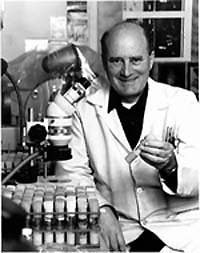Concept 27 Mutations are changes in genetic information.

 Hermann Muller received the 1946 Nobel Prize in Physiology or Medicine for his work on mutations induced by X-rays. Seymour Benzer used genetics to prove that mutations were caused by changes in the DNA sequence.
Hermann Muller received the 1946 Nobel Prize in Physiology or Medicine for his work on mutations induced by X-rays. Seymour Benzer used genetics to prove that mutations were caused by changes in the DNA sequence.
- Go to:
- Hermann Muller (1890-1967)
Seymour Benzer (1921-2007)

Seymour Benzer was born in 1921 and grew up in the Bensonhurst neighborhood of Brooklyn, NY. His parents emigrated from Warsaw, Poland and worked in the garment industry. Although his family was not interested in science, Benzer dissected flies in his basement lab and read books on atomic physics during synagogue.
At 15, Benzer graduated from high school and studied physics and chemistry at Brooklyn College on a Regents Scholarship. He continued his study of physics in graduate school at Purdue University where he worked on a secret military radar project.
Later in grad school, Benzer read a short book called What is Life?, the same book that turned James Watson from ornithology to his quest for the structure of DNA. Erwin Schrodinger's book had a similar effect on Benzer because it made the mysterious nature of genes sound like the problem to solve. Benzer took the summer bacteriophage course at Cold Spring Harbor Laboratory in 1948 with Gunther Stent. After struggling to learn the course's most important skill - holding a test tube in one hand and the test tube cap and pipette in the other - Benzer was hooked on biology.
Benzer returned to Purdue as a professor of physics, but spent most of his time travelling to other labs to work in molecular biology. In 1953, after Watson and Crick published their model of DNA, Benzer hatched his plan to get inside the gene by using bacteriophage with mutant rII genes. Max Delbrück ridiculed the plan and told Benzer "you must have drunk a triple highball before writing this." Benzer's 5-year-old daughter Martha liked the plan better and sketched her vision of two phages infecting a bacterium. In 1971, Benzer received the Lasker Award for this "brilliant contribution to molecular genetics."
After ten years of work on the rII system, and prompted by observations of his two daughters, Benzer began studying how genes shape behavior. As a professor of biology at Caltech, he and his graduate student Ronald Konopka were the first to find a gene that controls an organism's sense of time. Benzer received the Crafoord Prize in 1993 for his pioneering work in genes and behavior. He won the Albany Medical Center Prize in Medicine and Biomedical Research (2006), which has been called the American Nobel Prize, for demonstrating that single gene mutations in Drosophila can greatly affect behavior.
Benzer worked on genes and aging in fruit flies with support from the Ellison Medical Foundation Senior Scholars in Aging Program. When he was not spending the night working in his lab (he thought he was a clock mutant), he could be seen warming up a lunch of cow's udder or bull testicles on his Bunsen burner, prying open locked doors, and playing with his plastic eyeball keychain.
Benzer suddenly died of a stroke at 86 in November 2007.


All "golden delicious" apples derive from a mutant branch of a single "red delicious" apple tree.

90% of known cancer-causing chemicals are also mutagens. How do you think these chemicals cause cancer?
 DNA and proteins are key molecules of the cell nucleus.
DNA and proteins are key molecules of the cell nucleus. One gene makes one protein.
One gene makes one protein. A gene is made of DNA.
A gene is made of DNA. Bacteria and viruses have DNA too.
Bacteria and viruses have DNA too. The DNA molecule is shaped like a twisted ladder.
The DNA molecule is shaped like a twisted ladder. A half DNA ladder is a template for copying the whole.
A half DNA ladder is a template for copying the whole. RNA is an intermediary between DNA and protein.
RNA is an intermediary between DNA and protein. DNA words are three letters long.
DNA words are three letters long. A gene is a discrete sequence of DNA nucleotides.
A gene is a discrete sequence of DNA nucleotides. The RNA message is sometimes edited.
The RNA message is sometimes edited. Some viruses store genetic information in RNA.
Some viruses store genetic information in RNA. RNA was the first genetic molecule.
RNA was the first genetic molecule. Mutations are changes in genetic information.
Mutations are changes in genetic information. Some types of mutations are automatically repaired.
Some types of mutations are automatically repaired.